- Home
- Jon McGregor
If Nobody Speaks of Remarkable Things Page 10
If Nobody Speaks of Remarkable Things Read online
Page 10
Up in the attic flat of number twenty-one, the woman with the henna-red hair is watching the old couple. She is standing naked at the small high window, a length of hair turned in her fingers, she is looking at the old couple and smiling. She calls through to her boyfriend, in the kitchen, she says have you seen this come and have a look at this, it’s those two from number twenty, they’re all dressed up for something, it’s sweet, and his voice comes back saying yeah yeah in a minute in a minute. But in a minute they will be gone, and so he won’t see them, arm in arm along the pavement, heads held high, stepping slowly and precisely. She was wearing a proper dress, not like a granny dress but some kind of elegant fifties thing, and a blue hat with a ribbon, and she had a matching shoulderbag and shoes, this is what she will tell her boyfriend in a moment. And he was wearing a sharp suit, like in a black and white film, he had a white handkerchief in his breast pocket, and a trilby like Sinatra she will say.
And she looks at the two of them, so proud-looking, she wishes she had a camera so she could take a picture, she wonders where they might be going dressed up like that. She watches them until they round the corner into the main road and then she turns away.
You’ve missed it now she says to her boyfriend.
Outside, the twins have found a couple of milk crates in the tangled front garden of number fifteen and are busy dragging them out to make a wicket with. Their sister is back on two legs, walking carefully behind the old couple, following them around the corner.
The sun is high enough to light up the windows on both sides of the street now, the shade retreating to the cooler paving beneath the trees. The only clouds are pale and thin, hung as high as they can manage, like cobwebs in the high arches of a stairwell, and the sky is a freshly scrubbed blue, as permanent-looking as the first day of the holidays.
The girl sidles around the corner and leans against the wall, peering at the old people in their fancy clothes.
They stand at the bus stop, this couple, this husband and wife of fifty-five years, and they look at each other. Have you got the right change she says, and he pulls a handful of money from his pocket and counts it out in the palm of his hand, nudging the coins aside with a quivering finger. Yes love he says, and he drops it all back into his pocket.
We’ve not missed it have we she says, and he looks at his watch, unhooking it from his waistcoat and holding it up to his face like a pocket mirror. No love he says, and he looks down the empty road to where the bus will appear.
Do you think the weather will hold out she says, and he doesn’t even glance at the gleaming blue sky before he says yes love I’m sure it will love. It’s going to be a good day he says, and he turns to her and he puts his hands round her shoulders, just you wait and see he says, and then the burr of the bus creeps up behind him and she points her eyes at the opening door and they step aboard, pay the fares, and take their seats as the bus moves away up the road.
And if either of them were to look over their shoulder now they would see the young girl standing on the corner, watching the bus grind its way up the long hill out of town, lifting an imaginary hat from her head and trying to wink. But neither of them are watching, they’re too busy settling themselves in their seats, she straightening her dress, he removing his hat and smoothing his thick white hair, both of them shuffling into a comfortable position.
And behind them, on the corner of her street, the young girl tries again, two winks coming out at once, and she frowns and holds one eye open with a finger and a thumb while she lifts an imaginary hat from her head.
Chapter 17
Sarah called me at work yesterday, when I was in the middle of thinking about my mother and what I was going to do next, she said why didn’t you call me back?
I said I’d been going to, and it sounded like a lie.
She said she’d been at a party with some people from university and she’d met this guy who’d been asking after me.
I said what party, which people?
She said oh it was nothing really, not really anyone you knew.
But this guy she said, he was asking me how well I knew you, he was asking me where you were living now.
I said who was there that I know?
She said some names, and they were people that I remembered, and I said so how come no one told me?
She said oh it was just a last-minute thing, it was nothing special she said.
But this guy she said, this guy was asking me about you, and he said he wanted to get in touch with you.
She said it was that nervous guy’s brother, you know the guy at number eighteen who always blinked a lot, didn’t say much to anyone, it was his brother.
I don’t know what he was doing there she said, I think Jamie knew him or something but he was dead nice.
She said he wanted to get your number off me, he’s heard a lot about you from his brother apparently.
He’s really nice she said, I think you should meet him, his name’s Michael.
So I said okay, without really thinking about it, and she said she’d phone him up and give him my number.
And he phoned me about half past four, very politely, and said he hoped I didn’t mind him doing this or think he was strange but he was interested to meet me.
I said no, not at all, no.
He suggested a pub, and a time, and he said you’ll know who I am I look like my brother.
I didn’t spend much time getting ready.
I ate something out of the microwave, I put on some clothes that didn’t smell of photocopy ink, I switched the answerphone on.
I kept wanting to change my mind, but I didn’t have his number and it seemed rude to just not turn up.
So I went, and I met him, and we bought drinks and started to talk.
And he was very easy to talk to, and we talked a lot.
We said so where do you live, and what do you do, and where did you live before, and how did you get here tonight.
We talked about people we knew and didn’t know, piecing together our connections like genealogists.
It was tenuous, there was Jamie who used to live with Rob with the skateboard, and as of a few days ago there was Sarah.
And there was his brother, although I didn’t really know him at all.
I started to feel relaxed, the way sometimes a new person in an unfamiliar pub can make you feel, with the loud music and the smell of beer and cigarette smoke.
I said I thought it was a strange thing to do, to come and meet him like this, but that I was glad I had.
He said he’d been worried about calling me, but more worried about not calling me, and did that make any sense?
I thought about all the people I haven’t called or written or spoken to and I said yes it makes a lot of sense.
I said but what made you want to get in touch in the first place, why now?
He said oh no it wasn’t deliberate I didn’t come looking, it was just a chance thing he said, meeting Sarah at the party and her saying she knew you.
He said my brother told me a lot about you it made me curious, and I said oh nothing bad I hope.
He told me his brother had gone away travelling somewhere, and I said by the way you really do look very much like him.
He said I should think so too we’re twins and I said oh I didn’t realise.
He said what so he didn’t ever tell you about me? and he seemed surprised.
I said well no I didn’t really talk to him that much, I didn’t know him that well really.
I mean he’s quite shy isn’t he I said.
He put his drink down when I said this, a little too hard and some of the beer sloshed to the top of the glass and out onto the table.
He said, well, he can be quiet, sometimes, it depends.
I wasn’t sure what he meant, I carried on talking, I said I saw him around quite a bit but it’s just he wasn’t on my course or anything.
It felt as though I was trying to justify myself and I wasn’t sure why.
> He said, well, that’s a shame, I think you would have enjoyed talking to him, he’s interesting, he would have had a lot to say.
He said, he wanted to talk to you.
And then he looked at me and said I should tell you something, can I tell you something.
He said my brother, he was in love with you.
I said, oh, really?
I said how do you know?
He said he told me, he said I knew it anyway.
He lifted his glass to his face and said and I can see why just before the beer reached his mouth.
He moved his eyes around the room, as though he was looking for someone.
He wiped the froth from his top lip with the back of his hand.
I drew circles in spilt lemonade, I looked at him.
I said but I don’t know him, I said I didn’t even know his name.
He didn’t say anything, he looked straight at me and I wasn’t sure if he’d heard me.
The pub was quite noisy by then, a jukebox and a fruit machine and a hundred people gulping down pints and raising their voices to each other.
I started to repeat myself, louder, but he shook his head and said no hold on you lived in the same street.
He said you lived a few doors away, you saw him nearly every day, you knew lots of things about him.
He said you noticed if he got his hair cut, you had opinions about his clothes, you knew he couldn’t catch a cricket ball, you knew he lived on his own, if you saw him in the street you knew him enough to say hello.
He said these things loudly, scratching the back of his hand, and they were all true, and he drank more beer and held up his hands and raised his eyebrows.
He said and you didn’t know him?
You didn’t even know his name?
He went to the toilet after that, and when he came back it was as if he hadn’t said anything, the conversation moved on and he stopped scratching the back of his hand.
We talked about work, about unfulfilling jobs and not knowing what to do about it.
We talked comfortably, way past last orders and I found myself wishing I’d tidied the flat.
Even briefly trying to remember if I was wearing decent underwear.
I could see why Sarah had thought I should meet him, he was interesting and he was funny and he was really quite nice to look at.
He had nice hands, and pretty eyes, and he didn’t turn away when I looked at him.
I couldn’t understand why, since they were twins, I’d never really noticed his brother that way.
And I couldn’t understand how his brother could have claimed to have felt like that about me.
I asked him about it, I said what did your brother tell you about me, but the barstaff were hustling us out and he didn’t hear me.
And now, in the slow grey light of the morning, I am looking at him and thinking about it some more, about what he said.
He is so remarkably similar-looking, it feels as though I’m seeing a ghost.
He has the same thinness of hair around the temples, the same curved fold of skin beneath each eye.
I wonder if his brother ever imagined this moment, my pausing over his closed body and examining its lines and tones and folds.
I think about the few times I spoke to his brother, about how little I can remember of those occasions.
I wonder what his brother would say if he knew he was here now.
I remember the edge in his voice last night when he asked how I didn’t even know his brother’s name.
I put the mug of tea on the floor beside the sofa and turn back towards my room.
I put my hand to my belly and imagine feeling something, a faint shift, a nudge.
Chapter 18
The upstairs flat at number twenty is empty for now, the husband and wife gone for their day of quiet celebration, the bed neatly made and the breakfast things stacked in the draining rack. It’s a small flat, ordered and tidy, wingbacked armchairs in the living room arranged to suit the television, a welsh dresser in the kitchen parading unused fine china, the bed in the bedroom wrapped in eiderdown. In the kitchen, on the formica-topped wooden table, there are two cards, propped up against the salt and pepper mills like telegraph boys leaning against postboxes. The cards are similar, both cream with gold lettering, both depicting a bouquet of flowers, roses on one, carnations on the other. Happy Anniversary they both say, with all my love. One of them says darling inside, the other says sweetheart. On both of them the handwriting is awkward and scratched, as though written on a moving surface, a table with uneven legs, the dashboard of a cornering car.
There are photographs on the dresser, amongst the decorative teapots and the royal doulton figurines, a lifestory waltzing across the varnished wood. A wedding photo, framed in carved oak, he in a soldier’s uniform, face shiny and tight and smiling, breast pockets fastened down with rigorously polished buttons, and she tucked into the side of him, the pins in her hair concealed with small white flowers, her dress curving away from her neck and puffing proudly out around her arms.
Another photo, perhaps ten years later, the two of them standing by the sea, somewhere sunny, the sky bright and crisp and he has a handkerchief knotted across his head, the four corners poking up like cloth thumbs, and she has a wide-brimmed straw hat which casts a weave of shadow across her face. There are small boats on the sea behind them, small boats with square red sails and long pointed bows, and there are islands on the horizon, a woman dressed in black in the background, stooping to pick something up off the beach.
There is a larger photo, a wide curve of people standing in a garden, couples with their children, the husband and wife from these other photos standing to one side, smiling as broadly as the rest.
And in smaller pictures, mounted in oval silver frames, the children from that wide photo in the garden grow up, bursting into colour photography, going gap-toothed, long haired, surly, squeezing partners of their own into the pictures, holding scrolls of paper, holding babies.
But mostly there is this husband and wife, in colour photos taken by friends and relatives, or by passers-by on daytrips and holidays. The two of them outside Buckingham Palace. The two of them blowing out candles on a cake. The two of them on a ferry, wind blowing their hair, pointing at the white cliffs of Dover.
On the windowsill, in between the tobyjugs which hide missing buttons and foreign coins, in between the bowls trophies and the decorative egg timers, there is a medal, mounted on a plain white card, propped up against the windowframe. He hadn’t wanted her to put it on display, but she had, and he’d turned away from arguing about it. It’s a plain-looking medal, like a large thick coin, no ribbon, The Defence Medal written on one side and a younglooking King George on the other. She polishes it sometimes, when she thinks he’s not looking. You know it’s nothing that, he said to her once, not so long ago, you shouldn’t shine it up he said. They only gave them out for making it back home he said, and there’s nothing in that worth a medal. She’d looked at him when he’d said that, and he’d left the room. It was the first thing he’d ever said about it.
When he came back to her he knew he would be unable to talk, knew it as soon as he put his hand on the cold metal tailgate of the truck heading home and climbed up into the damp canvas darkness. He could see her face all through that long journey, waiting to hear his stories, wanting to comfort his sadnesses. He could see the expectation she would have in her eyes, not knowing what he would say but knowing that he would surely say something, the same way he’d always told her stories when he’d been away.
But this was different, and perhaps she’d understand. He’d never really been away before, not actually away, he’d only been on training, done exercises, and the stories he’d had to tell were interesting and funny and easy to put into words. Wading through sodden marshland carrying wooden rifles, and his boot had come off and got lost and when he put the rifle down to find it the sergeant had shouted at him for damaging his weapon. Slitting open sandba
gs with fixed bayonets, the sand spilling onto the ground and the sergeant shouting twist and withdraw, twist and withdraw. Hiding in the forest all night with green makeup on his cheeks, everything silent and black except the red firefly tips of the other men’s cigarettes and in the morning the sergeant had said you would all be dead by now. He’d told her these stories over the long weekends they spent together, short snatches of time they were granted between his long spells of duty. What have you been doing this time she’d say, and he’d tell her about the marches, the assault courses, the shooting practice, the running around in deserted villages commandeered by the government. And she’d take off his jacket and circle her fingers around his arm, testing his muscles, telling him what a strong man he was.
He’d thought about that on the journey home, her squeezing the strength of his arm like that, and he’d thought about how much bigger his arms had got while he’d been away, how she wouldn’t be able to circle her small hands round his muscle anymore and whether that would make him feel strange to her. There would be nothing else to make him feel strange to her, he’d thought, he had no wounds, no broken bones, no scars or missing limbs. Just very strong arms, and a new quietness.
He’d worried about going back, all the way he’d worried, wondered how she would be, if she would still be there, if things could be as they were before, if they could get on now with making the home they’d been kept from making, and then she’d stood behind him in the rain and said there’s no need to shout I’m right behind you and he’d known that things would be okay.
They’d talked a lot about making a home, before he’d gone away, during those weekends, talked about where they might live and what they might do, names they might give to their children, furniture they might buy, or make, or inherit. I’d really like a Welsh dresser she’d say, her fingers tracing absent-minded outlines across the bones of his face, I’ve always wanted one, with the plates all lined up nicely, and he’d said yes that would be nice and had to ask someone later what a Welsh dresser might be.

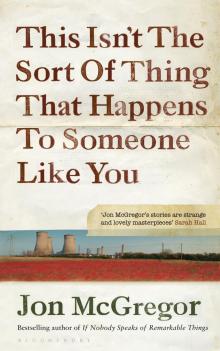 This Isn't the Sort of Thing That Happens to Someone Like You
This Isn't the Sort of Thing That Happens to Someone Like You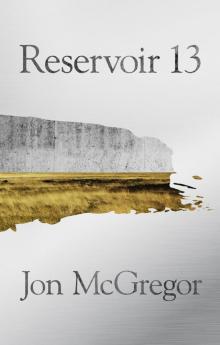 Reservoir 13
Reservoir 13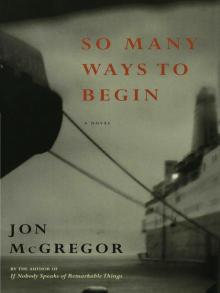 So Many Ways to Begin
So Many Ways to Begin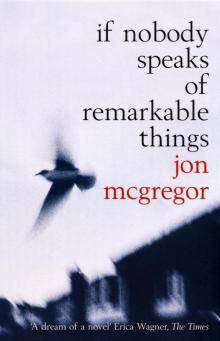 If Nobody Speaks of Remarkable Things
If Nobody Speaks of Remarkable Things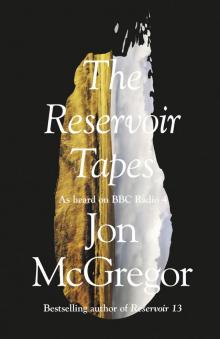 The Reservoir Tapes
The Reservoir Tapes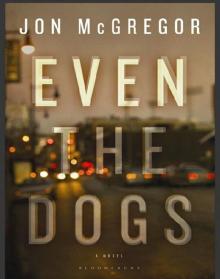 Even the Dogs: A Novel
Even the Dogs: A Novel